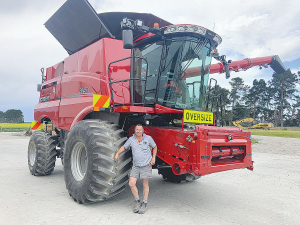Case IH Farmall C Upgrade: More power, weight & precision
The Case IH Farmall C, well known across New Zealand, has just seen an upgrade including a new look, increased weight and hydraulic power, and a cab overhaul.
 Turley Farms manager Andrew Smith says his bottom line is cab comfort and strong support from the dealership.
Turley Farms manager Andrew Smith says his bottom line is cab comfort and strong support from the dealership.
The latest tech is being utilised on Canterbury-based Turley Farms.
Turley Farms is a Canterbury-based, family-owned enterprise that grows vegetable, seed and pasture crops – including wheat, barley, potatoes, white clover, onions, grass seed and carrot seed.
The operation also produces hybrid radish, spinach, canola, sunflowers and peas for processing. During the winter, they finish store lambs, some dairy cow wintering – along with finishing some beef cattle.
The business is largely self-contained, backed by technology to keep the many wheels of its 12 prime movers rolling. The Case IH tractors on the properties run from 75 to 550hp. Many of these are fitted with Case IH Advanced farming Systems automated guidance, offering precision seed placement down to 2cms, delivered by Trimble RTK.
With this technology available, real-time data monitoring from the Vantage system offered by Trimble gives insight into farm areas such as soil moisture levels. Then, by comparing the results from a weather station reading, they can calculate soil deficit and crop demand.
For fertiliser application, each paddock is grid referenced and soil tested. From this a variable application map is created, which is then sent to a suitably equipped spreader. This then can deliver the expensive product at variable rates from 50 to 200kg per hectare.
Turley Farms manager Andrew Smith says his bottom line is cab comfort and strong support from the dealership.
“It doesn’t matter what colour the machine is, or what bit of machinery it is – they’ve all got the risk of breakdowns,” he says. “For us, the key question is how well the problems are addressed when they arise.”
Turley Farms’ Case IH equipment is supported by the local dealer Cochranes, who – in turn – are backed by Case IH NZ.
When it comes to machinery and technology, Turley Farms looks for ease of operation.
“Last year during harvest, we ran 17 fulltime and 13 overseas staff working on the farms,” Smith explains.
“Five combines might be working simultaneously in different crops at the peak, feeding different crops or varieties of the same crop back to multiple drying and storage facilities – so attention to detail is paramount.”
Preventing crop contamination is a real focus of the team, from the farm managers, agronomists, permanent staff, and seasonal harvest staff. Crop hygiene starts with the agronomists in the paddock, moves onto harvesting, drying and storage – then away to market.
Given what’s at stake, particularly in the case of high value vegetable seed, crops hygiene is king. Turley Farms uses a large air compressor and an industrial vacuum cleaner to clean the combines, during crop or variety changes and at the end of the season.
Controls on the movement of fruit and vegetables in the Auckland suburb of Mt Roskill have been lifted.
Fonterra farmer shareholders and unit holders are in line for another payment in April.
Farmers are being encouraged to take a closer look at the refrigerants running inside their on-farm systems, as international and domestic pressure continues to build on high global warming potential (GWP) 400-series refrigerants.
As expected, Fonterra has lifted its 2025-26 forecast farmgate milk price mid-point to $9.50/kgMS.
Bovonic says a return on investment study has found its automated mastitis detection technology, QuadSense, is delivering financial, labour, and animal-health benefits on New Zealand dairy farms worth an estimated $29,547 per season.
Pāmu has welcomed ten new apprentices into its 2026 intake, marking the second year of a scheme designed to equip the next generation of farmers with the skills, knowledge, and experience needed for a thriving career in agriculture.

OPINION: Here w go: the election date is set for November 7 and the politicians are out of the gate…
OPINION: ECan data was released a few days ago showing Canterbury farmers have made “giant strides on environmental performance”.